Patristic Meditations on Foot Washing – Holy Thursday
Meditation 1: Origen – The Mystery of Foot Washing
Our Lord Jesus, unlike Abraham or Joseph, did not delegate the act of foot washing. Abraham said, “Let water be brought, and wash your feet” (Genesis 18:4), and Joseph’s steward—not Joseph himself—brought water for his brothers (Genesis 43:23–24). But Jesus, who said, “I am among you as one who serves” (Luke 22:27), personally poured the water and began to wash the disciples’ feet. Why? Because only He could do it in a way that gives them a portion with Him.
Origen teaches that the water symbolizes the Word of God—a Word that purifies the foundations of the soul. When our spiritual “feet” are washed, we are made ready to bring good news to others (cf. Romans 10:15; Isaiah 52:7). Yet the disciples could not fully grasp this mystery at the time, because such understanding requires spiritual enlightenment.
Like Peter, who said, “You shall never wash my feet,” we often act with sincere intentions but mistaken judgment. Jesus responded to Peter’s resistance with a firm truth:
“If I do not wash you, you have no part with Me.” (John 13:8)
This teaches us that without Christ’s washing, there is no inheritance with Him, no beauty in our steps, and no readiness to serve in the Gospel. Even Judas—whose heart was already planning betrayal—was not washed. As Scripture says:
“He who is filthy, let him be filthy still.” (Revelation 22:11)
And the devil entered him after receiving the morsel. (John 13:27)
Jesus washes the feet of those already “clean” through His Word (John 15:3), but even the clean need this extra act of purification—because no one is clean before God unless washed by Christ Himself.
He alone carries our impurities, symbolized by the towel He wrapped around Himself (John 13:4). He bears our sins in His body, as the prophet foretold (Isaiah 53:4). And just as Moses removed his sandals on holy ground (Exodus 3:5), the disciples needed clean feet to walk the narrow and sacred road of the Gospel.
In short, Christ did not wash their feet before His Passion—He waited for the moment when His betrayal was unfolding, revealing that this cleansing is tied to the mystery of the Cross. The ones whom Christ washes are those who will preach the Good News, for:
“How beautiful are the feet of those who preach the gospel of peace.” (Romans 10:15)
Meditation 2: St. John Chrysostom – The Lesson of Humility
St. John Chrysostom emphasizes how Christ demonstrated perfect humility. He didn’t simply wash the disciples’ feet—He did everything Himself: He rose from supper, laid aside His garments, wrapped Himself with a towel, poured the water, and began to wash each one (John 13:4–5). This was no performance—it was the full labor of love.
Chrysostom reflects on Peter’s reaction:
“You shall never wash my feet.” (John 13:8)
It was not out of arrogance but deep reverence. Peter couldn’t imagine his Master stooping so low. Yet Jesus did not appeal to Peter’s logic—He shook him by saying, “If I do not wash you, you have no part with Me,” which frightened Peter into asking for his hands and head as well.
Why did Christ wash them if they were already “clean”? To teach humility. Even though they had not yet received the Spirit, Jesus calls them clean—not because they were sinless, but because they had accepted His Word. He adds:
“You are already clean because of the word which I have spoken to you.” (John 15:3)
By choosing to wash their feet—the lowest and most unclean part of the body—Christ taught that no act of service is beneath us. He wanted them (and us) to know:
“If I then, your Lord and Teacher, have washed your feet, you also ought to wash one another’s feet.” (John 13:14)
He didn’t just teach it—He lived it. And if the One who sits above the cherubim washed the feet of His betrayer, what excuse do we have for pride?
Meditation 3: St. Augustine – Daily Foot Washing
St. Augustine reflects on the symbolic meaning of Jesus washing the disciples’ feet. He asks: What is so surprising about the One who shed His blood to wash our sins also washing their feet with water?
In baptism, our entire being is cleansed. But as we walk through life—still “touching the earth” with our thoughts and actions—our spiritual feet get dirty again. So, Jesus continues to wash us daily.
We see this in the Lord’s Prayer:
“Forgive us our debts, as we forgive our debtors.” (Matthew 6:12)
And again in 1 John:
“If we confess our sins, He is faithful and just to forgive us our sins and to cleanse us from all unrighteousness.” (1 John 1:9)
This is the daily foot washing—Christ tending to our steps, guiding and correcting us.
When a believer humbles himself before another, asking for forgiveness or offering it, it is as if he is washing his brother’s feet. Augustine reminds us: foot washing is not only what Jesus did—it’s what we are now called to do for one another.
And just as Jesus removed His outer garments and wrapped Himself with a towel, He took off the visible form of glory to assume the servant form—for us. So when we bow to serve others, we enter the mystery of Christ’s humility and share in His blessing:
“If you know these things, blessed are you if you do them.” (John 13:17)
Meditation 4: St. Gregory of Nyssa – Walking the Royal Road
St. Gregory sees the act of foot washing as a way Christ prepares the soul for the journey. The bride (the Church) must walk the narrow, royal road with clean feet. When Christ washes our feet, He purifies our way.
He ties this image to Psalm 93:
“The Lord reigns, He is clothed with majesty… He has girded Himself with strength.” (Psalm 93:1)
That strength is the towel wrapped around Him. It is a symbol of the power that cleanses.
St. Gregory reminds us that in baptism we take off our shoes—symbolizing the removal of the filth of sin. We now walk not in mud, but on the Rock, Christ Himself (cf. Psalm 40:2). To stay clean, we must remain on that path and avoid the side roads of sin.
Even John the Baptist said he was unworthy to untie the sandal of Christ (John 1:27). Why? Because Christ was not bound by sin—He was pure.
When our feet are washed, our lives are redirected. We no longer turn to earthly distractions. Instead, we walk forward with readiness to serve, to preach, to sacrifice. Christ Himself becomes our holiness:
“Christ Jesus… became for us wisdom from God—and righteousness and sanctification and redemption.” (1 Corinthians 1:30)

